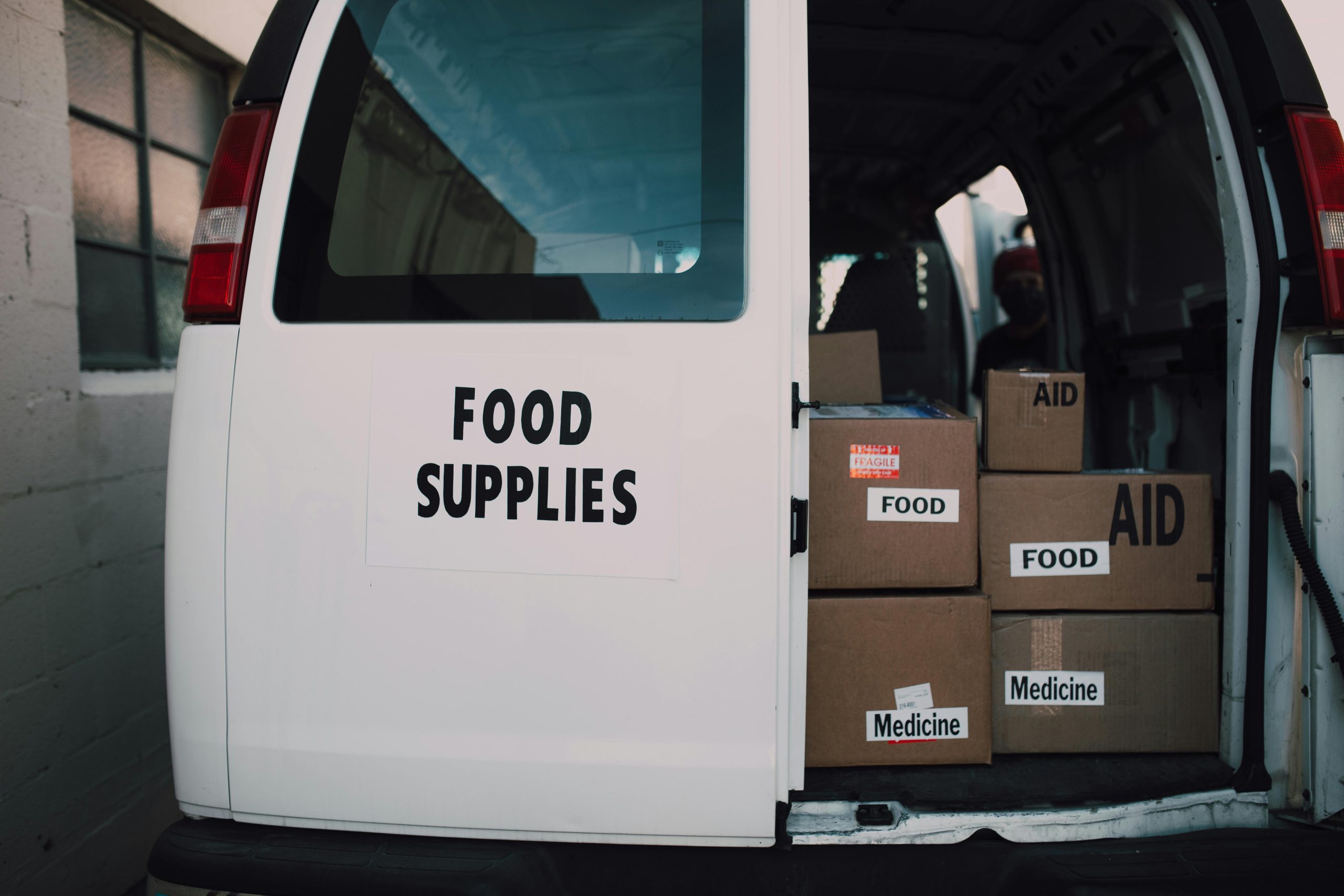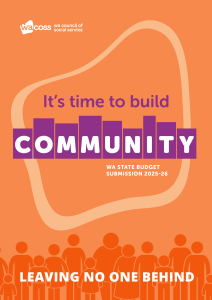Response to the Senate Economics Legislation Committee
Exposure Draft Inquiry into Tax Laws Amendment (Incentivising Food Donations to Charitable Organisations) Bill 2024
The Western Australian Council of Social Service Inc. (WACOSS) welcomes the opportunity to provide a submission on the Senate Economics Legislation Committee’s Inquiry into Tax Laws Amendment (Incentivising Food Donations to Charitable Organisations) Bill 2024.
WACOSS is the peak body for the community services sector in Western Australia (WA) and works to create an inclusive, just and equitable society. We advocate for social and economic change to improve the wellbeing of Western Australians, and to strengthen the community services sector that supports them. WACOSS is part of a network consisting of National, State and Territory Councils of Social Service, who advance the interests of people on low incomes and those made vulnerable by social systems and structures.
Submission detail
Food insecurity is the reduced, irregular or unreliable access to nutritionally appropriate or safe foods required for good health and wellbeing.[1] Food insecurity is underpinned by six pillars, these are: availability, access, utilisation, stability, sustainability and agency.[2]
Rising living costs have resulted in a significant increase in the number of households across Australia who are unable to, or struggling to, put food on the table. At the end of 2023, 37 per cent of WA families said they were not food secure and reported skipping meals or changing their shopping to cover costs. Of these households, 60 per cent had at least one person in paid employment and 77 per cent had experienced food insecurity for their first time within the last year.[3] The consequences of food insecurity are significant, with food insecurity shown to negatively impact both individual and community health, economic, and social outcomes.
Families experiencing food insecurity may turn to food relief or food assistance services for support. These services provide low or no-cost food to people in need and may be provided to people as a one-off, or on an ongoing basis when the experience of food insecurity is entrenched. Emergency food relief may also be provided to people or communities following a disaster event. It is important to note that while food relief provides temporary relief, it does not address the systemic drivers of food insecurity in our community.
The current food relief system is complex – with effective service delivery requiring significant coordination between donors, funders, community service organisations and volunteers. This includes coordinating resources that enable the appropriate transport, storage, sorting, distribution, and disposal of food items. All parts of the system must be aligned to mitigate the potential for system bottlenecks and effectively deliver food to those who need it most.
WACOSS sees the Tax Laws Amendment (Incentivising Food Donations to Charitable Organisations) (the Bill) as a potentially valuable tool in increasing the volume of food items available to the food relief sector. However, increasing food volume without consideration of overall system capacity has the potential to create unintended consequences and see scenarios where large companies receive tax benefits for donating food items that cannot be used.
The Bill should be considered in context of the broader food and emergency relief system and we urge you to explore any unintended adverse consequences, particularly for those experiencing food insecurity. Further comments are included in the five recommendations outlined below.
Finally, it should be noted that while working to reinforce our strong food relief system is a noble short-term goal, as a country our broader focus should be on creating equitable food and income systems where everyone can afford to put food on their table.
Recommendation 1: Establish a classification system to regulate the quality and types of food donations which are eligible for the tax offset.
It is important that families using food relief services can access high quality and nutritious food, that is suitable for distribution through food relief services. As such, any programs or incentives designed to encourage food donations must consider the types and quality of food donated as well as the volume of food. As it stands, the proposed Bill does not guarantee that donated food is suitable for food relief, is high quality and safe for human consumption, or of high nutritional value.
The health, cultural and dietary requirements of consumers are often unmet when accessing food relief. A recent study into the nutritional quality of food donated to a food bank in Western Australia revealed that 42 per cent of donated food products were unsuitable.[4] The same study revealed that the main types of food donated were unhealthy sweet and savoury snacks, of which 82 per cent of these donations were made by supermarkets. Alarmingly, four per cent of donations were found to be unsafe for human consumption.
Food relief organisations have shared with WACOSS the challenges that come with receiving unsuitable food donations. For example, an Aboriginal Community Controlled Organisation (ACCO) delivering health promotion and lifestyle programs to First Nations communities recently described receiving donations such as sugary cereals and carbonated beverages. These foods did not meet the cultural needs of recipients and were nutritionally unsuitable for program participants living with chronic health conditions. Subsequently the ACCO experienced the difficult choice of passing donations to people living with food insecurity or risking their relationship with families by supplying culturally unsafe food which could negatively impact health and wellbeing and dismantle the nutrition education being provided. If the current Bill was in place at this time, the food donor could have received tax offsets for inappropriate donations that could not be used, were of low nutritional value, and were not fit for purpose. This is not acceptable or appropriate.
Products donated to food relief should meet quality and nutritional standards and be suited to consumer needs. To ensure the tax incentive does not lead to a large volume of unsuitable foods being donated a classification system must be established which regulates the nutritional quality and types of food eligible for the tax offset.
Recommendation 2: Consider the infrastructure needs of the charity food sector to support the delivery of food relief to people experiencing food insecurity.
Food relief organisations require adequate resourcing and infrastructure to deliver food relief services. Whilst the tax offset will increase the volume of food donated, it will not necessarily lead to more food relief being provided to people experiencing food insecurity as it does not address infrastructure shortages, and in some instances may make bottlenecks worse.
The provision of food relief is generally led by underfunded community organisations predominately reliant on a volunteer workforce. These organisations allocate a significant proportion of their resources to store, sort, prepare and deliver food relief to people experiencing food insecurity. As demand for relief and food volume increases, so do service resource and infrastructure needs. To be effective, the tax offset must be considered alongside additional support for the charity food sector to distribute an increased volume of food donations to the community.
It is also noted that when the quantity of perishable foods is too large for the food relief sector to distribute within a suitable timeframe, organisations are left to deal with food waste. Alongside the introduction of a classification system for donations, consideration must be given to how we can support community services, and people receiving food relief, deal with the increase in packaging and food waste which could arise from additional food donations.
Recommendation 3: Consider needs of regional and remote communities
While many households across WA experience food insecurity, remoteness is one of the main predictors of food insecurity.[5] Remote and regional residents are 30 per cent more likely to experience food insecurity than those in capital cities.[6] Further still, First Nations people living in remote communities face the greatest risk of food insecurity compared to any other group.[7] Remote areas face significant barriers to food access – logistical challenges in transporting food to remote communities; limited choice in food store; significantly higher prices of food; limited access to fresh fruit and vegetables; and limited nutritional choices.
Remote and regional communities have less access to community services than metro areas. These communities are unlikely to have a food charity storefront and have limited access to other emergency relief services. Further, many emergency relief services are not equipped to receive food donations. Where a regional hub may have a service that can process food donations, financial and transport barriers prevent remote community members from accessing such service. As such, this Bill is unlikely to deliver substantial benefit to the communities most in need of food relief. To tackle food insecurity where it is felt worst, further mechanisms are required.
Recommendation 4: Balance donation incentives with other options to bring down food prices
Rising costs of essential goods, coupled with slow wage growth mean that people across WA are increasingly unable to make ends meet, with people on low incomes being hit the hardest. Increasing food prices is a major contributor to the financial pressures many households are experiencing. Between March 2021 and September 2023, food and non-alcoholic beverage prices rose by 15.2 per cent. Basic food prices rose even more dramatically – cheese by 27.3 per cent, milk by 22.7 per cent and eggs by 19.7 per cent. Foodbank’s 2023 Hunger Report showed an increase in food insecurity, with 79 per cent citing increased cost of basic needs, predominantly food and groceries, as the major cause.[8] This issue is exacerbated in regional and remote areas which tend to face higher grocery prices. A 2024 Inquiry into Price Gouging found over this same period, the profit margins of major supermarkets increased.[9]
Short term incentives to support charitable food relief, while potentially increasing the volume of donated food, will not solve food insecurity in the longer term. If food and groceries are unaffordable to many, particularly those on income support and minimum wages, people will continue to experience food insecurity. This Bill may result in increased profit margins for major supermarkets. In working towards sustainable eradication of food insecurity, it is important to balance incentivisation of donations, with acceptable profit margins and work to bring the cost of groceries, an essential item, down to an affordable level for all community members.
Recommendation 5: Raise the rate of income support payments
Income support payment levels in Australia are insufficient to cover the costs of basic needs, including food. People relying on income support payments are forced to choose which needs go unmet. After paying housing and utility costs many have very little, or nothing, left for food in their meagre budgets and experience high levels of deprivation and health consequences. A 2023 survey conducted by ACOSS found that almost all participants reported that the cost of their groceries had increased over the 12 months prior.[10] 68 per cent reported eating less or skipping meals in order to stretch their budget. Single parents consistently reported skipping meals so that their children could eat. 99 per cent of respondents advised that the inability to cover the cost of basic goods and services affected their mental health, and 94 per cent advised it affected their physical health.
JobSeeker, Youth Allowance, Austudy, Abstudy, Special Benefit and Parenting Payment should be permanently increased to at least $80 per day, which is the current pension rate. In addition to the base rate increase, there should be supplementary payments paid to people with disability and illness and single parents that reflect the additional costs they experience. Commonwealth Rent Assistance should also be more than doubled to reflect rents paid by people on low incomes.
For enquiries related to this submission, please contact Ashleigh Gregory, Community Relief and Resilience Coordinator, [email protected], (08) 6381 5300.
References
[1] Food Relief Framework. (2019). Available at https://wacoss.org.au/wp-content/uploads/2019/10/Food-Relief-Framework-report-sml.pdf
[2] HLPE. (2020). Food security and nutrition: building a global narrative towards 2030. A report by the High Level Panel of Experts on Food Security and Nutrition of the Committee on World Food Security, Rome.
[3] Foodbank Australia. (2023). Foodbank Hunger Report. Available at: https://reports.foodbank.org.au/wp-content/uploads/2023/10/2023_Foodbank_Hunger_Report_Summary.pdf
[4] Mossenson, S., Giglia, R., Pulker, C.E. et al. Dietary risk of donated food at an Australian food bank: an audit protocol. BMC Nutr 9, 67 (2023). https://doi.org/10.1186/s40795-023-00719-8
[5] Joint Standing Committee on the Commission for Children and Young People. (2023). Hungry for Change Report. Available at: https://www.parliament.wa.gov.au/Parliament/commit.nsf/(Report+Lookup+by+Com+ID)/B51A875893263FC0482589D500291565/$file/Hungry%20for%20Change%20-%20JSCCCYP%20report%206.pdf
[6] Landrigan, T., Kerr, D., Dhaliwal, S., & Pollard, C. (2018). Protocol for the Development of a Food Stress Index to Identify Households Most at Risk of Food Insecurity in Western Australia.
[7] Health Infonet. (2018). Review of nutrition amongst Aboriginal and Torres Strait Islander People.
[8] Foodbank Australia. (2023). Foodbank Hunger Report. Available at: https://reports.foodbank.org.au/wp-content/uploads/2023/10/2023_Foodbank_Hunger_Report_Summary.pdf
[9] Australian Council of Trade Unions. (2024). Inquiry into price gouging and unfair pricing practices. Available at: https://www.pc.gov.au/__data/assets/pdf_file/0003/380892/sub001-competition-analysis-attachment3.pdf
[10] Australian Council of Social Service. (2023). “It’s hell”: how inadequate income support is causing harm. Available at: https://www.acoss.org.au/wp-content/uploads/2024/06/ACOSS-cost-of-living-report2-March-2023_web_FINAL.pdf.pdf




